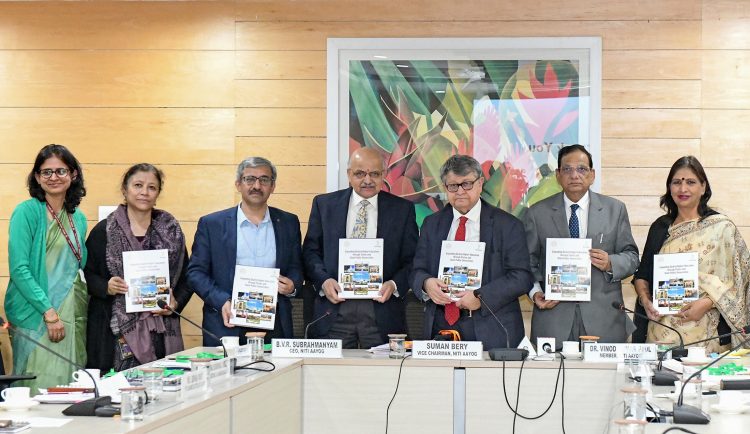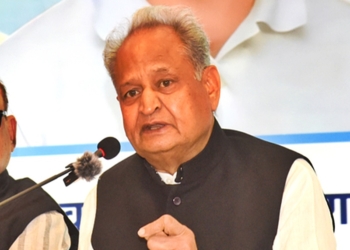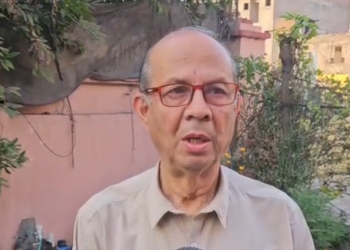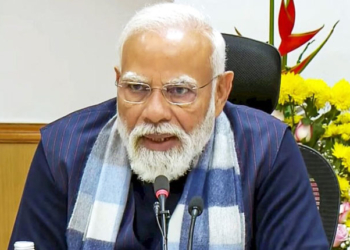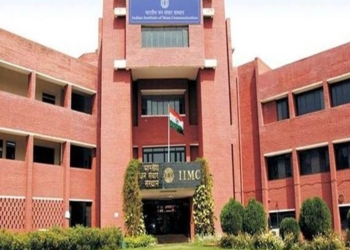New Delhi: A groundbreaking policy report titled ‘Expanding Quality Higher Education through States and State Public Universities’ was released on Monday, providing a comprehensive analysis of the challenges and opportunities in India’s higher education system.
The report was launched by Suman Bery, Vice Chairman of NITI Aayog, BVR Subrahmanyam, CEO of NITI Aayog, and other officials.
The report offers a detailed examination of the decadal transformation in higher education across the states and state public universities (SPUs). It focusses on the goals outlined in the National Education Policy (NEP) 2020. It also presents a set of policy recommendations aimed at improving the quality of education, funding, governance, and employability in these institutions.
“We must ensure that our higher education system is not only growing in number but is also delivering quality,” said Suman Bery, Vice Chairman, NITI Aayog, during the release of the report. “This report highlights critical areas where action is needed to enhance the quality, accessibility, and global competitiveness of our state public universities.”
The report is the first of its kind, featuring a quantitative analysis of the performance of SPUs and capturing insights from consultations with officers from 20 states and UTs, 50 Vice Chancellors, senior academics, and heads of State Higher Education Councils. It includes over 80 policy recommendations across four key areas: Quality, Funding & Financing, Governance, and Employability, along with a detailed implementation roadmap that spans short-term, medium-term, and long-term actions.
Key policy recommendations that the NITI Aayog report has come out with include the following important areas:
Quality
The report stresses enhancing research capabilities and “improving pedagogy” in SPUs. Key recommendations include the introduction of a National Research Policy, creating Centres of Excellence in clusters of SPUs to tackle local challenges, and promoting Humanities Research. The report also calls for the creation of Multidisciplinary Education and Research Universities (MERUs) to bridge gaps in research and education.
“To strengthen the research ecosystem in India, we need to ensure that SPUs are not only centres of education but also hubs of innovation and entrepreneurship,” says an official.
Funding & Financing
The report highlights the importance of improving financial autonomy for SPUs and enhancing their infrastructure. Recommendations include establishing State-level Infrastructure Finance Agencies, supporting tax exemptions for SPUs, and encouraging CSR contributions to improve infrastructure. It also suggests reviewing utility rates for SPUs to reduce operational costs.
Governance
A key focus of the report is improving the governance structures within SPUs. It advocates for the formulation of State-level Higher Education Vision for 2047 and empowering state councils for higher education, similar to the University Grants Commission (UGC). Other reforms include enhancing the autonomy of SPUs in administrative matters and revamping the faculty recruitment process.
“We need to bring about structural changes that allow SPUs the freedom to innovate while ensuring transparency and accountability,” say Aayog officials.
Employability
This is one of the most important areas where the thrust has been given in the report. To increase employability, the report suggests strengthening university-industry collaborations and enhancing internship and apprenticeship opportunities for students. It also stresses the importance of entrepreneurship and innovation programmes to encourage students to become job creators, not just job seekers.
Employability cannot be an afterthought. We must integrate industry-relevant curriculum and focus on holistic student development to prepare them for the challenges of the future, say NITI Aayog team members.
The report also includes over 125 Performance Success Indicators to measure the progress of these recommendations. These indicators will help track the success of initiatives across quality, funding, governance, and employability, ensuring that states and SPUs are held accountable for their contributions to expanding quality higher education.
(IANS)




